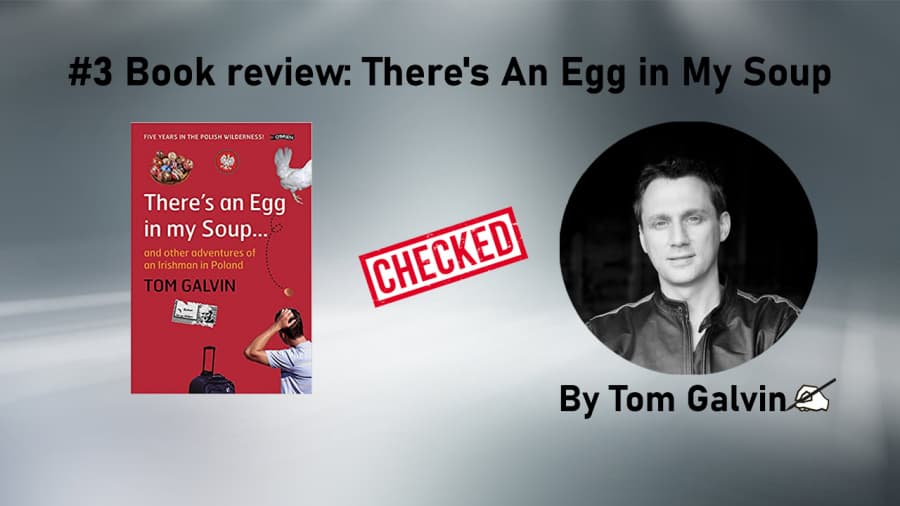There’s an Egg in my Soup … and other adventures of an Irishman in Poland. It’s a distinctly catchy title suggestive of a man who’s seen it all in Polska.
Dublin-born Tom Galvin went to Poland in 1994 to work with the Agency for Personal Service Overseas (APSO). Founded in 1973 in Ireland, APSO sent Irish volunteers to developing countries.
For five years, Tom taught English in a Polish state school in the town of Mińsk Mazowiecki. Mińsk is some 40km east of Warsaw.
Towards the end of his stay in Poland, Tom worked as a journalist for the Warsaw Voice and Radio Polonia in Warsaw.
Tom’s book There’s an Egg in my Soup … touches upon several important themes which I’d like to critique as both a writer and someone who’s been through similar experiences in Poland. These themes include:
- Loneliness
- Culture shock
- Polish hospitality
- Polish food
- Winter in Poland
Life in small-town Poland: Loneliness and a rather confused image of Polska
For those who haven’t lived in a small town in Poland, Galvin might come across as western-centric, cocky and ignorant.
However, I can relate to Galvin because I’ve been in his shoes, to some degree. Many of the author’s descriptions of life in Mińsk bring back memories of the first place I lived in Poland – Dębica – back in 2006. Dębica is a rather unremarkable small town in the southeast of the country.
A sudden pang of loneliness
So there was Tom on his first night in his clean, spacious yet bare living quarters. His only companions were the hum of the fridge, a huge old radio that the director had left and the fading summer evening sky outside.
In a state of contemplation that evening, Tom recalled some of the “rough” places he’d seen travelling with the other volunteers that day. Colleagues dropped off in villages lost in time. A sudden pang of loneliness hit Tom. He then began to unpack three large bags.
If there’s one thing Galvin can be praised for throughout There’s an egg in my soup …, then he’s not one to just gloss over extremely pertinent emotions for the sake of being macho.
When you’re a long way from home, pummelled by the first waves of culture shock, there’s no point faking an act of bravado when loneliness, isolation and, indeed, exhilaration take over.
A rather confused image of Poland ready to stand to scrutiny
Galvin didn’t leave Ireland for Poland with any grand visions of beauty. Drifting off to sleep on his first night in his new abode, the following pictures he’d built up in his mind before travelling to Poland were waiting to be inspected in the days to come:
❝ I had pictured timber houses, smoke gasping out of their chimneys day and night, sitting under the shadow of grey blocks that clawed the landscape like broken umbrellas. I had pictured old men with shattered teeth, young girls with bright blonde hair … Fields that were golden in autumn and steel blue in winter. Cold vodka, warm beds and the sound of men singing in taverns, keeping a beat with the thud of beer tankards on long wooden tables.
The next day, Galvin ventured out into Mińsk Mazowiecki – “the town that Lonely Planet forgot”. After clearing a side road that “looks like Beirut”, Galvin and his companion stopped at a Delikatesy. The author’s description bears the hallmarks of good old communist-style shopping:
❝ The shop is unusually wide but only about six feet deep, since the area for the public is abruptly cut off by an enormous length of counter. Behind this, all the produce is lined up in regimental style on shelves, the customers in front in a stiff and slow-moving queue.
With unrecognisable objects on shelves, senseless pictures and tins of cucumber perishing in a large jar of pickle, Galvin left empty-handed.
In my first few months in Poland, I recall that all those jars with questionable produce inside looked rather baffling to me as well. Hence, I became accustomed to trusty old frozen pierogi from Kaufland in my first year in Poland. Remarkably, it took me six years to pluck up the courage to buy ready-made Gołąbki (stuffed cabbage rolls) in jars.
Little of any historical note seems to stand out
I don’t believe Galvin was the ultra-critical Irishman in Poland that some of his most irate reviewers on Amazon and Goodreads have cracked him to be. In my view, he was just forthright in his observations.
Before EU money started pouring in, drab-looking buildings, notably train stations, were ten a penny in small-town Poland. Indeed, with regard to Mińsk Mazowiecki Central Station, Galvin noticed that:
❝ The grey and rather drab-looking building sits like crude Lego, the words ‘PKP Mińsk Mazowiecki’ in harsh chunky letters across the flat roof. The lettering is redolent of communism, its form direct, imposing and menacing.
For Galvin, Mińsk Mazowiecki lacked soul, if it ever had any in the first place. For the author, it resembled a satellite town which, like many towns near Warsaw, gives people somewhere to live.
When a river (the ‘Srebrna’ in Mińsk) flowing through a town or city has turned into a brackish stream, you know you’re in a one-horse town.
Galvin sized up the nature of the town within a single day. Simply, “little of any historical note” jumped out at the bewildered author.
Boredom and Sunday in Poland
I could never criticise conservative Poles for attending church and wanting to stay well clear of commercialism and shopping centres on Sundays.
However, Sundays may be a bit of a drag for a native speaker English teacher who’s just arrived in Poland and hasn’t yet found someone to hook up with.
Certainly, the ubiquitous sound of church bells and deserted streets might make the bored foreigner think of home. As Galvin commented with reference to his first Sunday in Poland:
❝ That particular Sunday was one of the worst days I spent in Poland. From the church bells at dawn to the buckets of rain, and the feelings of envy watching families and elderly people file into that old communist-style ‘stołówka’ (canteen) for lunch. I missed home dinners and I missed home. With only myself for company, I was bored beyond belief and keen just to start working.
Galvin’s boredom became so acute that a few weeks into term, he began to drink vodka with his students. Every TEFLer has done some unethical things. Hence, I won’t tear into Tom for getting sloshed with his students.
The Poles according to Tom: What are Polish people like?
The placid Pole
In all my time in Poland, a few unmentionable souls have told me that Poles are exceedingly straight-faced and placid.
So was Galvin onto something when he exclaimed the following?:
❝ I realised very quickly how placid the Poles were as a race – apart from some of the lunatics on the street I would eventually get to know – a placidity that was torn apart so many times throughout their history. So when I met a stare in the class, I felt taken with a sense of responsibility that was often uncomfortable.
Tom had his own theory regarding the ‘Polish stare’:
❝ Maybe they weren’t used to many foreigners. Maybe I was odd. But so many of these stares would be possessed of looks of such fragility that I was struck hard by thoughts about their backgrounds, what some of them may have gone through, and the possibilities that lay ahead.
The unsmiling Pole
I dealt with the issue of the ‘unsmiling Pole’ in this post about stereotypes of Polish people and Poland. Frankly, I tend to defend natives of a country when misinformed foreigners bandy about generalisations.
Leah Morawiec, founder of polonization.pl, touched upon the issue of Poles who don’t smile at people on the street (her view, not mine) in a post forewarning newbies in Poland of what they should know about Poles. Admittedly, Leah wasn’t malicious in this post. She even wrote that Polish people are very warm when you get to know them on a personal level. However, I find it all rather bizarre. Poles don’t smile at people on the street, but Americans do? I must have run into the miserable minority on the streets of America then during my six-week stay there.
Thinking about it, Tom doesn’t directly refer to the ‘unsmiling Pole’. I think that’s why I included this section here. The author doesn’t tar all Poles with the same brush. He’s at least analytical and empathetic when he refers to Poles’ supposed characteristics.
The Direct Pole – when something’s gone wrong, then something’s gone wrong
Gavrin doesn’t hold back in venting his frustrations with his worst groups of students.
Take, for example, his view regarding this bunch of nineteen and twenty-year-olds he taught:
❝ They were a generally depressed bunch in school, although good fun outside it, swaggering in late and disappearing from the room before the bell for the end of the lesson had even begun to echo. If some of the younger kids had a problem figuring out my methods, then to the older mob I was a complete enigma. They played cards, swore in Polish, darted in and out for cigarettes and at times didn’t show up at all.
What did Galvin have to do when the yobs didn’t show up?
Well, he had to resort to a nice piece of Polish directness. ‘Nie ma’, he’d tell the assistant director.
Literally translated as ‘no has’, ‘nie ma’ is rather a handy phrase to express the negative. In Galvin’s situation, ‘nie ma’ rather adopted the meaning of ‘not there’ i.e. the students didn’t bother to turn up.
The assistant director responded with a rather indifferent ‘nie ma’ as well.
Maybe such directness and willingness to not beat about the bush saves a lot of time and hassle.
As Galvin wrote:
❝ I came to learn quite quickly that when something went wrong here it wasn’t questioned much. It has gone wrong. And that’s about it. It made life easier, true, but it also made it very bewildering.
Polish food
In There’s an egg in my soup …, this oftentimes hungry Irishman in Poland wasn’t overly enamoured with Polish food.
What about this for a summary of Polish nosh:
❝ The majority of Polish food, much like Irish food, is derived from peasant culture, where you pull what is available out of the ground or running along its surface and fling it into the pot.
At least Galvin conceded that the Poles are “more imaginative than the Irish when it comes to creating dishes of this nature”.
You’re assured of an ironic chuckle or two if you read Galvin’s account of the daily treachery he endured in the school dining room. Picture “the eye-like nature of a boiled egg” in your soup. Frightening. Be sympathetic when you learn that Tom’s main dish was a “gamble” at the best of times. I’ve never tried flaki (tripe), and Galvin has hardly encouraged me to go out and get some tomorrow:
❝ [the tripe] looked like tapeworm, but was actually the lining of a sheep’s stomach.
An Irishman in Poland – An egg in his soup and other adventures
There are a few reviews of There’s an egg in my soup on Goodreads which point to Tom’s “ignorance”, “self-importance” and even “treatment of Poles as simple folk”.
Granted, Galvin does come down quite hard on, for example, Polish food and the role of the church and mass in Poland. However, it’s all rather tongue-in-cheek. Besides, I wonder if those reviewers would habitually eat tripe and dodgy soup with an egg in it.
Let’s not forget the loneliness, the cold in the boarding house and the many wayward and unmotivated students Galvin had to deal with. The author has to be credited for his resilience. He stayed, when the majority would have run away.
For all the gripes that Galvin had, he recognised that the school had made a great deal of effort to make his living quarters as comfortable as possible. It was a fair indication that certain people at the school cared. Moreover, in the acknowledgements section, the author directly praises the teachers, staff and indeed students themselves for their hospitality and friendship.
Overall, I believe that Galvin reflects on his time in Poland in the 1990s very fondly indeed.
About the author

Tom Galvin is an author, journalist and passionate musician who lives in Wicklow, Ireland, with his Polish wife, Asia, and twins, Alex and Alicia.
Contact
You can contact Tom via the contact form on his website:
Buy the book
Order a copy of There’s an Egg in my Soup on Amazon.

